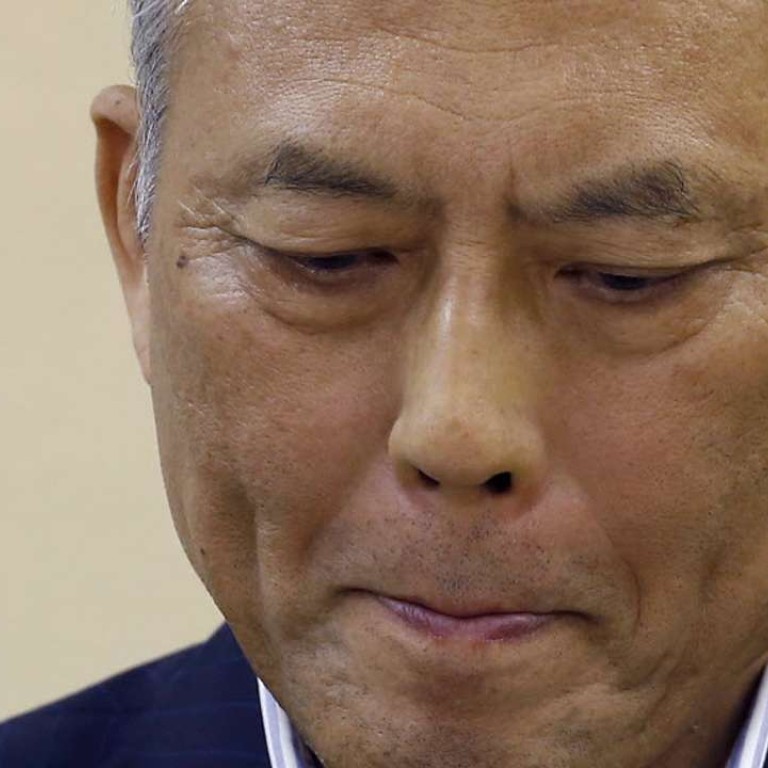
Booze, prostitutes, gangsters and gaffes: why Japan’s politicians have had to fall on their swords
Scandals continue to be synonymous with politics in Japan
The resignation on Wednesday of Tokyo Governor Yoichi Masuzoe makes him merely the latest Japanese politician to fall on his sword after being linked to behaviour not considered compatible with his position.
In Masuzoe’s case, the shenanigans were financial, with an investigative panel that he himself convened determining that while his spending of political funds on personal items was not illegal, it was most certainly “improper”.
Today, America has a black person as president... frankly speaking, they were slaves
Receipts that the governor submitted for reimbursement included works of art and, oddly, a set of children’s pyjamas.
Combined with earlier allegations of his lavish outlays on hotels and first-class flights for trips linked to his position as governor, it was too much even for his allies in the Tokyo assembly.
And as the former Governor packs up the mementoes of his two years and four months in office, he might ponder on the ranks of fellow resignees that he is joining.
In August last year, for example, Takaya Muto resigned from the ruling Liberal Democratic Party (LDP) after it was revealed that he had convinced 23 people into giving him Y40 million (HK$2.92 million) for shares in a software company that he claimed he would be able to access before they went on sale because he was a member of the Diet. The shares were never purchased and many of the investors never received their money back.
Things went from bad to worse for Muto, who stayed on in the Lower House as an independent politician, after it later emerged that he had been paying a male prostitute for assignations, including on one occasion at the residential complex for politicians in central Tokyo.
If Muto’s embarrassment was personal, Shoichi Nakagawa was accused of shaming the entire Japanese nation.
The minister of finance was in Rome in February 2009 for a meeting of his counterparts from the Group of Seven and slurred his way through a subsequent press conference.
Nakagawa – a renown drinker – blamed his condition on a combination of jet lag and cold medicine but the damage was done. He resigned three days later.
Less than eight months later, he was found dead, at the age of 56, at his home in Tokyo. It has been suggested that he committed suicide.
Tadahiro Matsushita chose a similar course of action in September 2012, shortly before a tabloid magazine was to publish an expose of the financial services minister’s extra-marital affair.
And we don’t have to go too far back for the previous ministerial suicide, with Toshikatsu Matsuoka hanging himself in May 2007, just before he was due to be questioned in the Diet over allegations of corruption.
Coupled with money and women, Japan’s underworld has been a cause for more than one politician to resign. In October 2012, for example, Justice Minister Keishu Tanaka stepped down after less than a month in office after it was reported that he had links with one of Japan’s notorious yakuza groups – transnational organised crime syndicates – and had accepted political donations from a foreign national, which is forbidden under Japanese law.
Others, however, have managed to hang on to their political careers – albeit largely in the background – after being accused of inappropriate behaviour.
Yoichi Miyazawa, for instance, had a lot of explaining to do in October 2014 when it emerged that his political funds management office had spent Y18,230 (HK$1,335) at an S&M bar in his Hiroshima constituency. Miyazawa, the trade and industry minister, denied knowing anything about the payment, which had been billed as an “entertainment expense”.
Similarly, Reconstruction Minister Tsuyoshi Takagi overcame allegations of both misusing official funds and stealing women’s underwear, while Kazuya Maruyama, a member of the LDP, defied demands that he resign after commenting in the Diet, “Today, America has a black person as president. This is a person who has inherited black people’s blood. Frankly speaking, they were slaves.”

